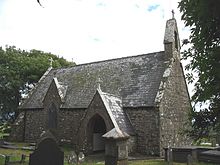- Cynfarwy
-
Cynfarwy was a Christian in the 7th century. He was venerated by the early church in Wales as a saint, although he was never formally canonised. St Cynfarwy's Church in Anglesey is dedicated to him, and his name is also preserved in the name of the settlement around the church, Llechgynfarwy (or sometimes "Llechcynfarwy").
Contents
Life and commemoration
Little is known for certain about Cynfarwy; his dates of birth and death are not given in the sources. According to the 19th-century Celtic scholar Robert Williams, Cynfarwy was active in the 7th century.[1] His name is recorded in the Bonedd y Saint, a Welsh genealogical tract compiled in the late 18th century using material from older manuscripts. He is described there as the son of "Awy ab Llehenog, Lord of Cornwall", but nothing is known about Awy ab Llehenog.[2][3]
Cynfarwy is venerated as a saint, although he was never canonized by a pope: as the historian Jane Cartwright notes, "In Wales sanctity was locally conferred and none of the medieval Welsh saints appears to have been canonized by the Roman Catholic Church".[4]
Church and feast day
Cynfarwy is the patron saint of St Cynfarwy's Church, Llechgynfarwy in Anglesey, north Wales. According to the 19th-century Welsh historian Angharad Llwyd, he established the first church there in about 630.[5] The present church (which is a Grade II listed building) mainly dates from the 19th century, but has some medieval fabric and a 12th-century font.[6]
Until the 19th century, there was a stone more than 9 feet (3 m) high in the field next to church, known Maen Llechgynfarwy (maen meaning "stone", llech meaning "slate" and "‑gynfarwy" being a modified form of the saint's name). The settlement around the church, which is about 10 miles (16 km) from the port of Holyhead, is known as Llechgynfarwy (or sometimes as "Llechcynfarwy").[3][5]
The traditional date for the feast of St Cynfarwy varies between antiquarian sources, although all place it in November. Some manuscripts say that it falls on the 10th, some on the 11th, whilst according to Angharad Llwyd and others the festival is marked on the 7th.[3]
See also
Other Anglesey saints commemorated in local churches include:
- St Caffo at St Caffo's Church, Llangaffo
- St Cwyllog at St Cwyllog's Church, Llangwyllog
- St Eleth at St Eleth's Church, Amlwch
- St Iestyn at St Iestyn's Church, Llaniestyn
- St Peulan at St Peulan's Church, Llanbeulan
- St Tyfrydog at St Tyfrydog's Church, Llandyfrydog
References
- ^ Williams, Robert (1852). Enwogion Cymru: A biographical dictionary of eminent Welshmen, from the earliest times to the present, and including every name connected with the ancient history of Wales. W. Rees. p. 95. http://books.google.co.uk/books?id=_wMGAAAAQAAJ&vq=caian&pg=PA61#v=onepage&q&f=false.
- ^ Parry, John Humffreys (November 1821). "Genealogy of the Saints". The Cambro-Briton (W. Simpkin and R. Marshall) III: 7–8. http://books.google.co.uk/books?id=yIhOAAAAIAAJ&pg=PA7.
- ^ a b c Baring-Gould, Sabine (1908). The lives of the British Saints: the Saints of Wales and Cornwall and such Irish Saints as have dedications in Britain. II. Honourable Society of Cymmrodorion. p. 243. http://www.archive.org/stream/livesofbritishsa02bariuoft#page/243/mode/1up.
- ^ Cartwright, Jane (Spring 2002). "Dead virgins: feminine sanctity in medieval Wales". Medium Aevum (The Society for the Study of Medieval Languages and Literature). http://findarticles.com/p/articles/mi_hb6408/is_1_71/ai_n28930393/?tag=content;col1. Retrieved 26 August 2011.
- ^ a b Llwyd, Angharad (1833). A History of the Island of Mona. R. Jones. p. 301. http://books.google.co.uk/books?id=DMY_AAAAcAAJ&printsec=frontcover#v=onepage&q&f=false.
- ^ Cadw (2009). "Church of St Cynfarwy". Historic Wales. http://jura.rcahms.gov.uk/cadw/cadw_eng.php?id=5396. Retrieved 26 October 2011.
Categories:- 7th-century Christian saints
- Medieval Welsh saints
Wikimedia Foundation. 2010.

